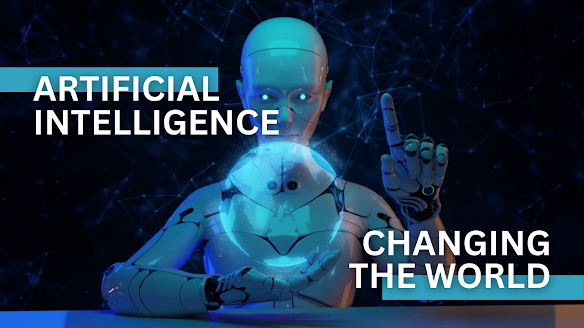"AI-Driven Revolution: Replacing Traditional SEO in the Modern Age"
How AI Changing Traditional SEO to Advance:-
The field of search engine optimization (SEO) is always changing, and organizations' approaches to enhancing their online presence have been profoundly influenced by the recent development of artificial intelligence (AI). Even though traditional SEO techniques are still important, artificial intelligence (AI) is changing the game by providing deeper insights, automating activities, and eventually leading to more sophisticated SEO methods.
Recognizing the Diversion from Conventional SEO:-
Backlink building, content production, and keyword research were all major components of traditional SEO. Even while they were still useful, these methods frequently required human labor and were unable to change to accommodate the constantly evolving search engine algorithms and user preferences. For example, keyword research entailed locating high-volume keywords and arranging them thoughtfully inside content. Unfortunately, this strategy frequently produced material that was overly keyword-rich and lacked the user experience emphasis that search engines currently place a high value on.
The Ascent of SEO Driven by AI:
AI gives SEO a new angle by utilizing its powers in automation, natural language processing, and data analysis (NLP). This results in a number of significant advances:Enhanced Keyword Research:
Artificial intelligence (AI) systems are able to discern not just high-volume keywords but also long-tail keywords, related searches, and user intent via analysis of massive amounts of search data. This makes it possible to have a more thorough grasp of what people are actually looking for, which helps to create material that better meets their needs.
material production and Optimization: By examining already-published, highly effective material, AI-powered solutions can help with content production by making recommendations for pertinent subjects, formats, and even writing styles. These technologies can also improve content by determining the best location for keywords, making sure headings are used appropriately, and assessing the ability to read and semantic coherence of the text.
Technical SEO Optimization:
Artificial intelligence is capable of automating processes such as mobile friendliness testing, sitemap optimization, and the detection and repair of broken links. This gives SEO experts more time to devote to strategic tasks like link building and content planning.
Customization and User Experience:
AI is able to examine user activity on a website to determine which areas encourage the most interaction from users and which cause them to leave. The user experience can then be made more unique by using this data to customize the navigation and content to each individual user's preferences.
Predictive analytics:
AThe future of search engine optimization will be further shaped by even more fascinating developments in artificial intelligence.
Recall that although artificial intelligence (AI) has many advantages, it is imperative to approach it strategically. Use AI as a tool to improve your current SEO campaigns, concentrating on areas where it can add the most value. However, never underestimate the role that human ingenuity and experience play in leading an effective SEO campaign.I can forecast future search trends and content requirements by examining user behavior and trends. As a result, companies may remain ahead of the curve by proactively producing content that corresponds with new search trends.
The Advantages of Using AI-Powered SEO:
Including AI in your SEO look at has many advantages, such as:
Improved Efficiency:
SEO specialists can concentrate on more advanced strategic thinking and analysis by automating repetitive operations.
Enhanced material Quality:
Artificial Intelligence (AI) offers data-driven insights to help produce material that is more pertinent, interesting, and educational for viewers.
Improved User Experience:
AI makes the user journey more personalized, which raises engagement and boosts conversion rates.
Competitive Advantage: Businesses may maintain an advantage over their rivals in the always changing SEO market by utilizing AI to get important insights and automation capabilities.
AI is a Great Ally, Not a Replacement:
It's critical to keep in mind that AI is not intended to completely replace conventional SEO techniques. Rather, it functions as a potent ally, enhancing current strategies and providing fresh possibilities. In areas like content ideation, strategy formulation, and general campaign management, human interaction is still vital.
The AI-Powered Future of SEO:
We may anticipate many more developments in SEO as AI technology advances.
AI could become more prevalent in:
Voice Search Optimization: With the growing popularity of voice search inquiries, AI can assist in customizing content for these queries.
AI is capable of analyzing and optimizing image and video material to raise search engine rankings and increase user engagement.
Real-time SEO Optimization:
AI may be able to offer real-time information and suggestions for modifying SEO tactics in response to search patterns and user activity.
In conclusion, it is undisputed that AI is changing the SEO field. Businesses can attain their desired website ranking and user experience, as well as a major competitive edge, by using this growing technology.
The future of search engine optimization will be further shaped by even more fascinating developments in artificial intelligence.
Recall that although artificial intelligence (AI) has many advantages, it is imperative to approach it strategically. Use AI as a tool to improve your current SEO campaigns, concentrating on areas where it can add the most value. However, never underestimate the role that human ingenuity and experience play in leading an effective SEO campaign.


.png)
.png)

.png)

Comments
Post a Comment